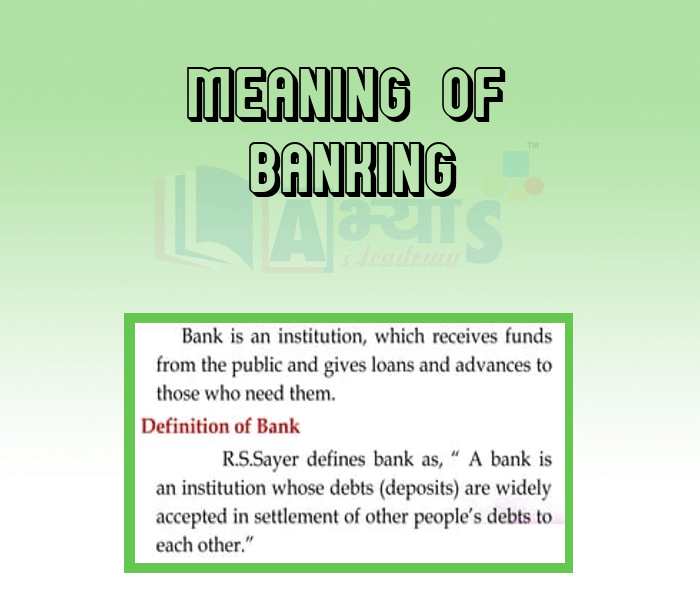Meaning Of Banking










Meaning Of Banking
Banking
Banking can be defined as the business activity accepting and safeguarding money owned by other individuals and entities, and then lending out this money in order to earn a profit.
Bank
Bank is a financial institution that undertakes the banking activity i.e., it accepts deposits and then lends the same to earn certain profit. Bank is a lawful organization, which accepts deposits that can be withdrawn on demand. It also lends money to individuals and business houses that need it
Role of Banking
Banks provide funds for business as well as personal needs of individuals. They play a significant role in the economy or a nation. Let us know about the role of banking-
Types Of Banks
There are various types of banks which operate in our country to meet the financial requirements of different categories of people engaged in agriculture, business, profession, etc. On the basis of functions, the banking institutions in India may be divided into the following types:
1. Central Bank (RBI, in India)
2. Commercial Banks
3. Development Banks (IFCI, SFCs, SIDBI, NABARD)
4. Co-operative Banks
5. Specialized Banks (EXIM Bank)
Central Bank
A bank which is entrusted with the functions of guiding and regulating the banking system of a country is known as its Central bank. Such a bank does not deal with the general public. It acts essentially as Government's banker, maintain deposit it accounts of all other banks and advances money to other banks, when needed. The Central Bank provides guidance to other banks whenever they face any problem. It is therefore known as the banker's bank. The Reserve Bank of India is the central bank of our country. The Central Bank maintains record of Government revenue and expenditure under various heads. It also advises the Government on monetary and credit policies and decides on the interest rates for bank deposits and bank loans. In addition. foreign exchange rates are also determined by the central bank. Another important function of the Central Bank is the issuance of currency notes, regulating their circulation in the country by different methods. No other bank than the Central Bank can issue currency.
Commercial Banks
Commercial Banks are banking institutions that accept deposits and grant short-term loans, and advances to their Customers. In addition to giving short-term loans, commercial banks also give medium - term and long - term loan to business enterprises. Now - a - days some of the commercial banks are also providing housing loan on a long-term basis to individuals. There are also many other functions of commercial banks.
Students / Parents Reviews [10]
Abhyas is a complete education Institute. Here extreme care is taken by teacher with the help of regular exam. Extra classes also conducted by the institute, if the student is weak.

Om Umang
10thBeing a parent, I saw my daughter improvement in her studies by seeing a good result in all day to day compititive exam TMO, NSO, IEO etc and as well as studies. I have got a fruitful result from my daughter.

Prisha Gupta
8thAbout Abhyas metholodology the teachers are very nice and hardworking toward students.The Centre Head Mrs Anu Sethi is also a brilliant teacher.Abhyas has taught me how to overcome problems and has always taken my doubts and suppoeted me.

Shreya Shrivastava
8thIt was good as the experience because as we had come here we had been improved in a such envirnment created here.Extra is taught which is beneficial for future.

Eshan Arora
8thMy experience with Abhyas academy is very good. I did not think that my every subject coming here will be so strong. The main thing is that the online tests had made me learn here more things.

Hiya Gupta
8thMy experience was very good with Abhyas academy. I am studying here from 6th class and I am satisfied by its results in my life. I improved a lot here ahead of school syllabus.

Ayan Ghosh
8thA marvelous experience with Abhyas. I am glad to share that my ward has achieved more than enough at the Ambala ABHYAS centre. Years have passed on and more and more he has gained. May the centre flourish and develop day by day by the grace of God.

Archit Segal
7thIt has a great methodology. Students here can get analysis to their test quickly.We can learn easily through PPTs and the testing methods are good. We know that where we have to practice

Barkha Arora
10thIt was a good experience with Abhyas Academy. I even faced problems in starting but slowly and steadily overcomed. Especially reasoning classes helped me a lot.

Cheshta
10thI have spent a wonderful time in Abhyas academy. It has made my reasoning more apt, English more stronger and Maths an interesting subject for me. It has given me a habbit of self studying
